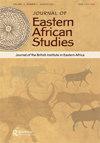刚果民主共和国前加丹加省少数民族社会文化协会的选举策略(2006-2019)
IF 0.6
3区 社会学
Q2 AREA STUDIES
引用次数: 0
摘要
摘要刚果民主共和国于2006年、2011年和2018年举行了多党选举。本文强调,前加丹加省的少数民族社会文化协会在政治上参与了刚果民主共和国的选举进程。这些协会最初成立于城市,旨在组织来自同一地区的移民之间的互助。在一个软弱的国家未能提供公共产品的背景下,种族作为选民参考框架的吸引力似乎有所增加。种族可能会影响刚果民主共和国的投票行为,因为人们认为,作为选票的回报,民选精英将优先考虑他们的种族社区。执政党人民大会党利用加丹加的种族协会来支持约瑟夫·卡比拉的总统候选人资格,以及总统多数派的立法候选人。这些族裔协会反过来试图影响有利于其社区的选举结果,例如限制每个选区的同族裔候选人数量,以避免族裔选票分裂,从而最大限度地提高本群体候选人的成功机会。他们的努力并不总是成功的;选举使选民能够追究精英当选后不履行承诺的责任。本文章由计算机程序翻译,如有差异,请以英文原文为准。
The electoral strategies of ethnic socio-cultural associations in former Katanga province, the Democratic Republic of Congo (2006–2019)
ABSTRACT The Democratic Republic of Congo (DRC) held multi-party elections in 2006, 2011 and 2018. This paper highlights that ethnic socio-cultural associations in former Katanga province have been politically involved in the DRC’s electoral process. Such associations were originally founded in cities to organise mutual aid among migrants hailing from the same region. The attractiveness of ethnicity as a frame of reference for the electorate seems to increase in the context of a weak state failing to deliver public goods. Ethnicity potentially influences voting behaviour in the DRC, as it is assumed that in return for votes, elected elites will prioritise their ethnic community. The ruling PPRD party has instrumentalised ethnic associations in Katanga to support Joseph Kabila’s presidential candidacy, as well as legislative candidates of the presidential majority. These ethnic associations have in turn tried to influence the outcome of elections in favour of their communities, e.g. by limiting the number of co-ethnic candidates per constituency to avoid ethnic vote splitting and thereby maximising the chances of success for candidates from their own group. Their efforts have not always been successful; elections enable voters to hold elites accountable for not keeping their promises once elected.
求助全文
通过发布文献求助,成功后即可免费获取论文全文。
去求助
来源期刊

Journal of Eastern African Studies
AREA STUDIES-
CiteScore
3.30
自引率
7.10%
发文量
12
期刊介绍:
Journal of Eastern African Studies is an international publication of the British Institute in Eastern Africa, published four times each year. It aims to promote fresh scholarly enquiry on the region from within the humanities and the social sciences, and to encourage work that communicates across disciplinary boundaries. It seeks to foster inter-disciplinary analysis, strong comparative perspectives, and research employing the most significant theoretical or methodological approaches for the region.
 求助内容:
求助内容: 应助结果提醒方式:
应助结果提醒方式:


